First thing I thought after catching John Woo’s new mega-period epic, Red Cliff, this weekend was, I wonder why I haven’t read any clever blog reviews discussing the film’s obvious subtext on America’s recent military adventurism yet. A few google searches later and I learned that the film not only hasn’t yet been released Stateside, it’s got no U.S. distributor. That, folks, is crazy. Either someone in Hollywood is really stupid, or someone in China is really greedy. (With regard to this movie, I mean.) To put it very simply, this is a great martial arts war flick, with a […]
Afghanistan Archive
Free Newsletter
This hasn’t been a particularly good week for anyone concerned by the creeping militarization of foreign policy in general, and development aid in particular. When President Barack Obama announced his Afghanistan strategy last month, a lot was made about the “diplomatic surge” element — roughly a thousand civilian posts to boost development work in the country. I remember thinking at the time that an increase of 1,000 civilians didn’t stack up so well with the increase of 21,000 troops that was announced at roughly the same time. But at least it was a start. Only trouble is, the NY Times […]
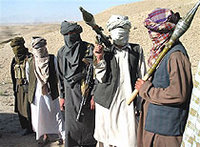
Few took issue with Secretary of State Hillary Clinton’s bold assertion on Wednesday that the Pakistan-based Taliban pose a “mortal threat” to the United States. The stakes, of course, are high. The Taliban provided safe haven to Osama bin Laden prior to the 9/11 attacks, and could very well be doing so now. Since fleeing Afghanistan following the U.S. invasion in 2001, they have mounted stubborn insurgencies on both sides of the border that separates Afghanistan from Pakistan’s tribal areas, and have now established footholds in formerly secure parts of Pakistan. The fact that Pakistan is a nuclear-armed power makes […]
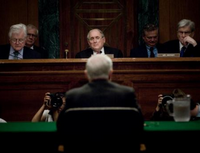
A fight is brewing in the U.S. military between manpower and technology. With the economy cratering and defense budgets flattening, we can no longer afford both large armies meant to pacify hostile populations, and legions of high-end air and naval platforms that fulfill our technological dreams. Because of the powerful political backing those high-end platforms enjoy, this budget conflict might spark a broad backlash to our recent fascination with wars of occupation. Our fetish for counterinsurgency campaigns has now made us a land power. We reacted to the wars in Afghanistan and Iraq by expanding the ground services, even as […]
I think Michael Cohen and I probably agree on more than he realizes, or at least more than what this post suggests. He identifies the militarization of foreign policy as the greatest danger of “embedding counterinsurgency doctrine in military planning.” I’m not sure about the causation there, since I don’t think the militarization of foreign policy depends exclusively on the trend towards COIN. But regular readers of the blog know that I consider the militarization of foreign policy not just a future danger but an alarming reality. And I agree with Cohen that the seductive “war-lite” aspects of COIN will […]
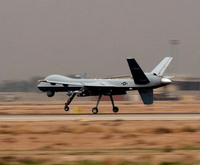
Last November, in the restive tribal region on Pakistan’s border with Afghanistan, an American Predator drone circled several thousand feet above the village of Ali Khel. Firing one of its Hellfire missiles, the drone destroyed a compound that was reportedly occupied by two senior al-Qaida officials: Abu Zubair Al Masri, an explosives expert from Egypt, and Rashid Rauf, a Pakistani linked to a 2006 plot to bomb London Heathrow airport. Both Al Masri and Rauf died in the blast, according to intelligence officials quoted by press reports. The attack was just one of scores of air strikes conducted by robotic […]
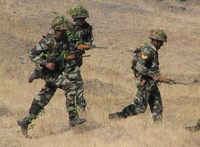
NEW DELHI, India — A series of brazen infiltration attempts by militant groups in Indian Kashmir have resulted in fierce gun battles with security forces, and threaten to exacerbate already tense relations between India and Pakistan. The skirmishes come amid fears of militant attacks on prominent political leaders as the campaign for India’s parliamentary elections gets under way. A five-day gun battle in north Kashmir’s Kupwara region left 17 militants as well as eight Indian Army commandos dead in the last week of March. The militants were part of an unusually large group of 25 Lashkar-e-Taiba (LeT) and Jaish-e-Mohammad (JeM) […]
A final thought on this weekend’s NATO summit. In his WPR Briefing on the subject, Soeren Kern had this to say: Obama put a brave face on the paltry results by saying they werea “strong down payment on the future of our mission in Afghanistan andthe future of NATO.” Butby providing only modest assistance incomparison to Obama’s 21,000-troop surge, NATO as an alliance hasessentially failed in Afghanistan. Indeed, the mission in Afghanistanis becoming increasingly Americanized: By the end of 2009, nearlytwo-thirds of the estimated 95,000 permanent foreign military personnelin Afghanistan will be American. Not only do I think that’s right, […]
One of the more prevalent military hardware stories that’s been flying just under the radar for the past few years is the shortage of helicopters for multilateral deployments. The EUFOR Chad force ultimately had to accept a Russian offer of eight copters, along with their operating teams, in order to cover the huge theater of operations under their jurisdiction. This Defense Industry Daily article describes how Coalition forces in Afghanistan have been forced to lease copters for non-military use from private contractors, in order to free up military copters for operations. This is a false shortage, to the extent that […]
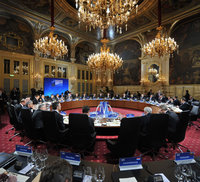
U.S. President Barack Obama’s debut NATO summit at the Franco-German border over the weekend was a triumph of style over substance. Although allies put on a public face of unity, they were unable to agree on any of the major problems facing trans-Atlantic security. As NATO marks its 60th birthday, the alliance is mired in a profound identity crisis offering little reason to celebrate. The summit was dominated by the problem of Afghanistan and what to do about it. European allies heaped praise on Obama’s new Afghan strategy, which sets benchmarks for progress in fighting al-Qaida and the Taliban in […]
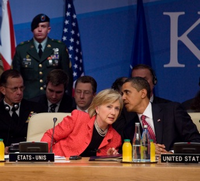
STRASBOURG, France — It’s a virtual certainty that the concerto played by violinist Anne-Sophie Mutter at NATO’s 60th anniversary dinner Friday night wasn’t chosen because of its nickname. Mozart’s Violin Concerto No. 5 is known as the “Turkish Concerto” because the composer used oriental themes in the final movement. But as it happened, the one discordant note in an otherwise harmonious summit was the down-to-the-wire threat by NATO member Turkey to veto the nomination of former Danish prime minister Anders Fogh Rasmussen as the alliance’s new secretary general. It took frantic, behind-the-scenes efforts, which delayed the start of the Saturday […]
What stood out most in President Barack Obama’s various press conferences I watched today was the divergence between the political theater in the run-up to the NATO summit, and the political substance that underlies it. On the political theater side, Obama acknowledged the French and German contributions to the war effort, while French President Sarkozy and German Chancellor Angela Merkel declared their full support for Obama’s Afghanistan strategy. On the political substance side, Obama made it clear that France and Germany need to contribute more troops, and Sarkozy and Merkel said, Non, and Nein, respectively. It’s not that there’s no […]

RAWALPINDI, Pakistan — Not very long ago, one of Malik Naeem’s favorite pastimes was an afternoon jaunt to McDonald’s with his granddaughters for french fries and a tour of the playground. Islamabad, the Pakistani capital where Naeem lives with his family, seemed sheltered from far-off concerns about growing militancy and insecurity along the Afghan border. That changed in an instant last September, when militants attacked the Marriott Hotel in Islamabad, just a few seconds’ drive from the Pakistani Parliament and Supreme Court buildings. The high-profile attack on a popular public establishment in a heavily guarded area meant that no place […]
No sooner do I finish posting about the G-20’s not-so-safe haven in London than I stumble across this AP dispatch: a federal court ruling extended to prisoners in Afghanistan the legal right to challenge their detention in U.S. courts. Here I think the fascinating parallel is easier to make: The thought immediately occurred to me that over the past eight years, the U.S. has essentially created its own safe havens, with the network of black-site detention centers being the functional equivalent of the Pakistani FATA, i.e., beyond the rule of law and outside of global governance mechanisms. Significantly, the Obama […]
There’s been a thought-provoking discussion of the centrality of Pakistani — or other — safe havens to al-Qaida’s operational capacity. Andrew Exum kicked things off here, Spencer Ackerman added some thoughts here, and Matthew Yglesias has some comments of his own here. The upshot is that safe havens are neither necessary nor sufficient to launch a terrorist attack, that it’s unrealistic to expect we can eliminate them because there will always be unstable corners of the world, and that focusing on physical space risks overlooking the role played by virtual space (i.e. the internet) in terrorist networks. Juxtapose that to […]
